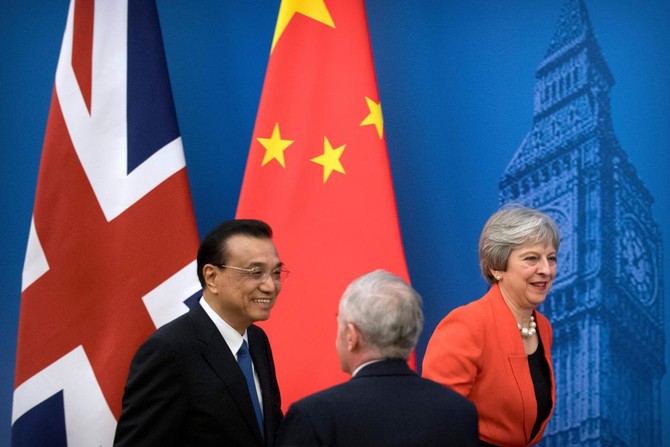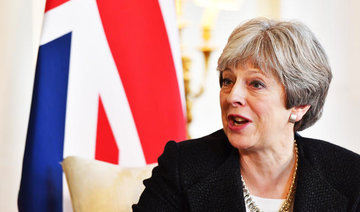BEIJING: British Prime Minister Theresa May on Wednesday called for expanding the “global strategic partnership” between the United Kingdom and China, at the start of a visit to the world’s second-largest economy focused on hashing out new trade arrangements once the UK leaves the European Union.
Meeting with Chinese Premier Li Keqiang, May referred to “a golden era” in relations between the two countries that London hopes will bring vast amounts of new job-creating investment from China’s fast-growing global firms.
“This is an auspicious time of the year to ... think about and consider how we can build further on that golden era and on the global strategic partnership that we have been working on between the UK and China,” May said.
Officials oversaw the signing of a raft of agreements covering trade — including the import of British food products to China — investment, education and other areas. More than 155,000 Chinese students now study in the UK, according to the British government.
Brexit appeared to figure prominently in the talks and May said that as Britain prepares to leave the EU “we are committed to deepening our strong and vital partnership” with China.
“And that relationship is indeed broad and deep and delivers benefits to both countries,” May said.
As Britain prepares to leave the EU, “we will become a country that is able to operate an independent trade policy and is able to sign free trade agreements around the rest of the world,” she said at a later question-and-answer session with Li.
Li said Brexit would not change the basic trading relationship.
“In EU-UK relations. We will have assessments and discussions in our trade relationship to take it forward,” Li said.
As she makes her China visit, May’s job is under threat from rivals within her Conservative Party, who are divided over whether to make a clean break with the EU or seek to keep the closest-possible economic relationship.
May insisted to reporters flying with her to China, “I’m not a quitter.”
She said there was “a long-term job to be done” by her government, according to the Press Association news agency.
“That job is about getting the best Brexit deal, it’s about ensuring that we take back control of our money, our laws, our borders, that we can sign trade deals around the rest of the world,” she said. “But it’s also about our domestic agenda.”
In her meeting with Li, May said the two countries, both permanent members of the UN Security Council, were also cooperating on North Korea and other security challenges. North Korea’s nuclear weapons program, she said, is “illegal, reckless and poses an unacceptable threat to international security.”
Li said they also discussed overcapacity in the steel industry, while May said an agreement had been reached to open China to imports of British beef this year. Business deals worth more than 9 billion pounds ($13 billion) would be announced before the end of the visit, May said.
May also expressed support for British involvement in the “Belt and Road” initiative, China’s mega-plan for trade and infrastructure links across Asia.
However, she said related projects needed to adhere to established global business practices. Beijing has been criticized for undermining those rules by agreeing to finance major infrastructure projects on condition they were awarded to Chinese companies without entertaining bids from competitors.
“We’ve discussed how the UK and China will continue to work together to identify how best we can cooperate on the Belt and Road initiative across the region and ensure it meets international standards,” May said.
“We will work together to encourage free and fair trade, ensure a transparent, rules-based multilateral trading system, and build an open global economy that works for all.”
May first visited the central industrial city of Wuhan on Wednesday before traveling to Beijing for talks with Li. On Thursday, she is scheduled to meet with President Xi Jinping, whose 2015 state visit to Britain helped propel what China refers to as the golden era in ties.
May is being accompanied on her visit by 50 British business leaders, including the chief executives of Jaguar Land Rover and drug firm AstraZeneca. She will also visit the financial hub of Shanghai before heading home Friday.
Bolstering ties with China became more urgent after Britain voted in 2016 to leave the EU, compelling it to forge new trade agreements outside of the 28-nation bloc.
British exports to China are up 60 percent since 2010, and China is expected to be one of the UK’s biggest foreign investors by 2020.
British finance minister Philip Hammond visited in December, pledging to promote London as a center for transactions in China’s yuan currency and announcing up to 25 billion pounds ($35 billion) in support for British businesses involved in the Belt and Road initiative.
But May appears more cautious about embracing Chinese investment than her predecessor, David Cameron. She annoyed Beijing in 2016 by temporarily delaying approval for a Chinese-backed nuclear power plant in southwestern England.


On China visit, Britain’s Theresa May focused on post-Brexit future
On China visit, Britain’s Theresa May focused on post-Brexit future

Philippine president announces new gas find in waters facing the disputed South China Sea
MANILA: Philippine President Ferdinand Marcos Jr. announced the discovery of a new natural gas deposit near an existing gas field in waters facing the disputed South China Sea, which could shield his country from a potential power crisis.
The discovery of the gas reservoir northwest off Palawan province was “significant” and could eventually supply power to more than 5.7 million households annually, Marcos said Monday.
The undersea reservoir is estimated to contain about 98 billion cubic feet (2.7 billion cubic meters) of gas. Initial tests showed 60 million cubic feet (1.6 million cubic meters) of gas could be extracted each day from the well, Marcos said without providing other details including when commercial production could start.
“This helps Malampaya’s contribution and strengthens our domestic gas supply for many years to come,” Marcos said. “Aside from the natural gas, the discovery also includes condensate, which is a high-value liquid fuel.”
The new gas deposit, called Malampaya East 1, was discovered by a Philippine consortium about 5 kilometers (3.1 miles) east of the main Malampaya gas field, where commercial gas production started more than two decades ago and was projected to considerably decline in a few years.
The Malampaya gas to power facility has generated more than 20 percent of the electricity to Luzon, the most populous northern Philippine island region. In 2023, Marcos extended an exploration contract in Malampaya by 15 years.
Experts have predicted Malampaya could run out of gas in a few years, which has sparked fears of a potential power crisis in Luzon, where the bustling capital and main financial and business district is located.
The offshore gas field lies within the country’s Exclusive Economic Zone of the Philippines, a 200-nautical-mile (370-kilometer) stretch of water from a country’s coastline where it has exclusive rights to explore and harness resources under the 1982 United Nations Convention on the Law of the Sea.
Philippine efforts to explore for oil and gas in another offshore region, the Reed Bank, has been stalled for years because of opposition from Beijing, which claims sovereignty over the area along with most of the South China Sea. The Reed Bank also lies in the fringes of the South China Sea west of the Philippine island province of Palawan.
Vietnam’s oil and gas exploration in the disputed region also has been opposed by China. Beijing claims virtually the entire South China Sea and has reinforced its presence including coast guard and naval patrols in the disputed waterway in recent years.
Malaysia, Brunei and Taiwan also have been involved in the region’s long-simmering territorial standoffs.
The discovery of the gas reservoir northwest off Palawan province was “significant” and could eventually supply power to more than 5.7 million households annually, Marcos said Monday.
The undersea reservoir is estimated to contain about 98 billion cubic feet (2.7 billion cubic meters) of gas. Initial tests showed 60 million cubic feet (1.6 million cubic meters) of gas could be extracted each day from the well, Marcos said without providing other details including when commercial production could start.
“This helps Malampaya’s contribution and strengthens our domestic gas supply for many years to come,” Marcos said. “Aside from the natural gas, the discovery also includes condensate, which is a high-value liquid fuel.”
The new gas deposit, called Malampaya East 1, was discovered by a Philippine consortium about 5 kilometers (3.1 miles) east of the main Malampaya gas field, where commercial gas production started more than two decades ago and was projected to considerably decline in a few years.
The Malampaya gas to power facility has generated more than 20 percent of the electricity to Luzon, the most populous northern Philippine island region. In 2023, Marcos extended an exploration contract in Malampaya by 15 years.
Experts have predicted Malampaya could run out of gas in a few years, which has sparked fears of a potential power crisis in Luzon, where the bustling capital and main financial and business district is located.
The offshore gas field lies within the country’s Exclusive Economic Zone of the Philippines, a 200-nautical-mile (370-kilometer) stretch of water from a country’s coastline where it has exclusive rights to explore and harness resources under the 1982 United Nations Convention on the Law of the Sea.
Philippine efforts to explore for oil and gas in another offshore region, the Reed Bank, has been stalled for years because of opposition from Beijing, which claims sovereignty over the area along with most of the South China Sea. The Reed Bank also lies in the fringes of the South China Sea west of the Philippine island province of Palawan.
Vietnam’s oil and gas exploration in the disputed region also has been opposed by China. Beijing claims virtually the entire South China Sea and has reinforced its presence including coast guard and naval patrols in the disputed waterway in recent years.
Malaysia, Brunei and Taiwan also have been involved in the region’s long-simmering territorial standoffs.
© 2026 SAUDI RESEARCH & PUBLISHING COMPANY, All Rights Reserved And subject to Terms of Use Agreement.













